Taking Action for Animals
 As a member of the Humane Society of the United States (HSUS), I took the train to Arlington VA this past July for the HSUS's annual "Taking Action for Animals" (TAFA) conference: Taking Action for Animals. Many of the nation's most knowledgeable and prestigious animal protection advocates were there to talk about issues such as factory farming and puppy mills, and animals in the research, "sport," entertainment, and fashion industries.
As a member of the Humane Society of the United States (HSUS), I took the train to Arlington VA this past July for the HSUS's annual "Taking Action for Animals" (TAFA) conference: Taking Action for Animals. Many of the nation's most knowledgeable and prestigious animal protection advocates were there to talk about issues such as factory farming and puppy mills, and animals in the research, "sport," entertainment, and fashion industries.
It was a pleasure to talk with like-minded people who share my values. We met Wayne Pacelle, President and CEO of the Humane Society. (Believe it or not, he's actually even more handsome in person!!) The food at TAFA was completely vegan and rather "interesting," as well as a challenge to the hotel chefs! Not so much as one egg was used to bake the cookies, nor did one pat of butter go into the mashed potatoes.
Meeting author Jana Kohl, Psy.D. and her adopted dog "Baby" was definitely one of the highlights of the extended weekend. Baby is a three-legged puppy mill survivor and the subject of Jana's recent book, A Rare Breed of Love: The True Story of BABY and the Mission She Inspired to Help Dogs Everywhere.
The food at TAFA was completely vegan and rather "interesting," as well as a challenge to the hotel chefs! Not so much as one egg was used to bake the cookies, nor did one pat of butter go into the mashed potatoes.
Meeting author Jana Kohl, Psy.D. and her adopted dog "Baby" was definitely one of the highlights of the extended weekend. Baby is a three-legged puppy mill survivor and the subject of Jana's recent book, A Rare Breed of Love: The True Story of BABY and the Mission She Inspired to Help Dogs Everywhere.
Jana and Baby were celebrating the conclusion of their 6-week cross country book tour on the Baby-bus. They began in Los Angeles and ended in front of the Capitol Building in Washington, D.C. at our rally to raise awareness about the abuses at puppy mills.
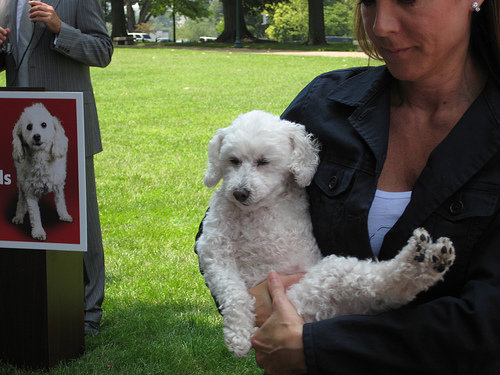
Jana Kohl adopted Baby - or number 94 as she was called at the time and which was tattooed inside her ear - when Baby was 9 and scheduled to be put down because she was too old to produce any more puppies. (Like Baby, approximately one quarter of the dogs in shelters are purebred.) A compassionate rescuer purchased Baby and placed her in foster care until she could be adopted into a forever home. Just two days later, as the kind caretaker was leaving the house to run some errands, Baby - eager not to be left behind by the first person who had ever shown her any kindness - jumped off the couch, resulting in a shattered left front leg. Years of over breeding and poor nutrition had led to severe osteoporosis. Baby's thin, brittle bones were so depleted that they could not withstand the jump, and could not mend.
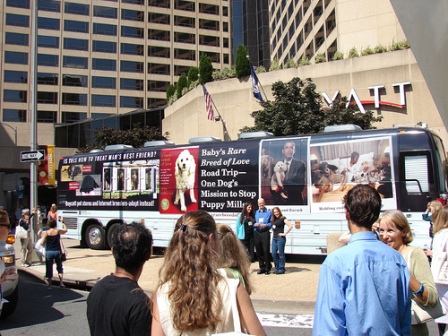
After 3 attempts to set the leg failed, there was no choice but to amputate. Baby cannot bark or make any sounds because she has been "de-barked," a common practice with puppy mill breeders so they don't have to listen to the dogs' constant cries - for food, water, for relief from extremes of heat and cold, for medical attention, love, or just to be let out of their wire prisons so they can run and play on real grass. Happily Baby quickly lost the constant nervous tic she had developed after years of confinement, escaping the fate of many puppy mill dogs who eventually go insane from lack of social interaction.
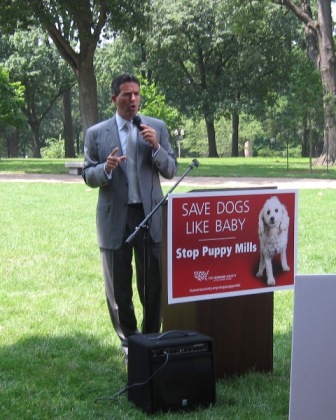 The HSUS arranged for conference attendees to meet with legislative staff who represent their respective Senators and Congressmen. I was able to speak with representatives in the offices of Senator Menendez, Senator Lautenberg, and Congressman Frelinghuysen. It was really interesting to visit the SOBs - which is what they actually call the Senate Office Buildings - and to get a feel for how the legislative process works. Bills must pass in both houses during the same Congressional session to become law. They are identified by a number, preceded by "S." for bills before the Senate or "H.R." for bills before the House. Of the many animal protection bills before Congress, the HSUS chose 4 bills that they felt had the best chance of passing, and suggested that we focus our energy on 2 or 3 of them. Animal protection issues cross political lines, so we were talking to both Republicans and Democrats. (See endnote 4 for more information about the 4 bills selected by the Humane Society.)
The HSUS arranged for conference attendees to meet with legislative staff who represent their respective Senators and Congressmen. I was able to speak with representatives in the offices of Senator Menendez, Senator Lautenberg, and Congressman Frelinghuysen. It was really interesting to visit the SOBs - which is what they actually call the Senate Office Buildings - and to get a feel for how the legislative process works. Bills must pass in both houses during the same Congressional session to become law. They are identified by a number, preceded by "S." for bills before the Senate or "H.R." for bills before the House. Of the many animal protection bills before Congress, the HSUS chose 4 bills that they felt had the best chance of passing, and suggested that we focus our energy on 2 or 3 of them. Animal protection issues cross political lines, so we were talking to both Republicans and Democrats. (See endnote 4 for more information about the 4 bills selected by the Humane Society.)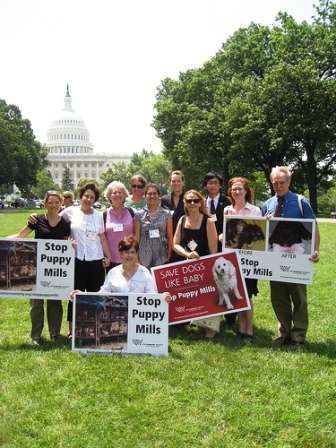
Despite the gravity of the puppy mill problem, A Rare Breed of Love is an uplifting and hopeful book filled with happy pictures of Baby with many of her famous friends. Jana Kohl's eloquent commentary reveals a deeply caring sensitivity to the feelings of animals coupled with the perceptive observations and insightful wisdom of a gifted psychologist. Jana is donating proceeds from her book to the Humane Society and the fight against puppy mills.
Jana on puppy mills:
Such legalized abuse struck me as a travesty - not only for the animals, but for the humans perpetrating it. By hurting these defenseless creatures, we are hurting ourselves just as much - damaging not just our soul, spirit, psyche, or whatever you choose to call it, but our society as a whole, which becomes contaminated by this kind of legalized cruelty. If it's acceptable for a business to abuse animals, it makes it easier for us as a society to abuse the environment, the poor, women, minorities, children, or any voiceless and vulnerable group. I had come to understand that the abuse of animals wasn't an isolated event that could be shrugged off as a necessary evil, or an unavoidable by-product of big business. It's something that sends shock waves through everyone and everything, from the factory farmer or puppy miller to the consumer and even the investor who buys stock in an animal-abusing company. It promotes a culture of abuse and destruction that impacts the quality of our lives on every level.
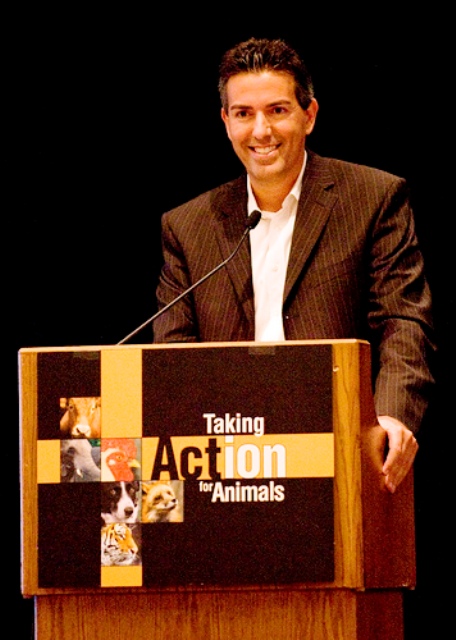 Here is an excerpt from Wayne Pacelle's interview with Jana during the TAFA conference:
Here is an excerpt from Wayne Pacelle's interview with Jana during the TAFA conference:
WP:
What is the most important thing that we can do - each of us, individually - to help put puppy mills out of business?
JK:
The single most important thing people can do is to adopt and NEVER buy a dog from a pet store or inhumane breeder. People ask me all the time, "What about humane breeders?" My reply Is to remind them that in this country we are euthanizing about 2 million homeless dogs a year, at a cost to taxpayers of more than a billion dollars a year. So long as we're killing millions of homeless dogs each year, why should anyone be adding to the pet overpopulation problem?
WP:
Are you a changed person because of this entire experience - rescuing Baby, writing the book, and doing a national book tour by bus?
JK: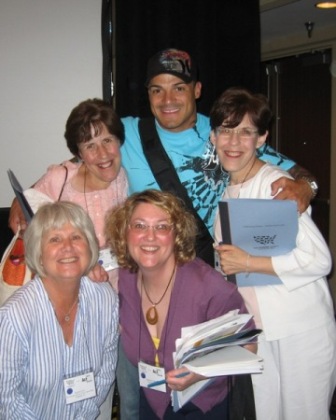 I've done a lot of things in my life that I felt were important, including working for the Simon Wiesenthal Center for Holocaust Studies, but adopting a puppy mill survivor has been the most important and meaningful experience I've ever had. To give a loving home to an animal who was abused is a life-altering, soul-fulfilling experience. I believe our mission in life is to ease the suffering of others, and the animals in our midst who are so cruelly abused have the fewest advocates. I'll never be able to rest so long as a single one is being mistreated. As for this cross-country tour and my mission to end puppy mills, it's been extraordinary to meet so many big-hearted people, including other rescuers, but the most gratifying is when someone comes up to us and says, "Your story changed my life. After reading your book and hearing you speak, I will only adopt from now on. I'm a changed person." That makes this long, hard schlep worth every minute on the road.
I've done a lot of things in my life that I felt were important, including working for the Simon Wiesenthal Center for Holocaust Studies, but adopting a puppy mill survivor has been the most important and meaningful experience I've ever had. To give a loving home to an animal who was abused is a life-altering, soul-fulfilling experience. I believe our mission in life is to ease the suffering of others, and the animals in our midst who are so cruelly abused have the fewest advocates. I'll never be able to rest so long as a single one is being mistreated. As for this cross-country tour and my mission to end puppy mills, it's been extraordinary to meet so many big-hearted people, including other rescuers, but the most gratifying is when someone comes up to us and says, "Your story changed my life. After reading your book and hearing you speak, I will only adopt from now on. I'm a changed person." That makes this long, hard schlep worth every minute on the road.
- Gerie
July 2008
- There are as many as ten thousand puppy mills operating in the US alone. Puppy mills continue to grow worldwide and via the internet.
- ISBN-13: 978-1-4165-6403-4
- Debarking is the cutting of a dog's vocal cords with scissors attached to a rod-like instrument that is forced down the dog's throat.
- Summary of 4 key bills the Humane Society is lobbying for this year:
ISBN-10: 1-4165-6403-9
- Baby's Bill: We asked our state's Senators and Congressmen to be original co-sponsors of what has been nicknamed "Baby's Bill." It requires all dog breeders who sell directly to the public and who sell more than 50 dogs per year to be federally licensed, and it requires that dogs at commercial breeding facilities be given one hour of exercise daily. The goal is to close a loophole in the Animal Welfare Act that allows puppy millers who sell directly to the public (i.e., internet based sellers) to be exempt from regulation by the USDA, thereby avoiding licensing and inspection requirements. By mandating daily exercise, the bill would ensure that breeder dogs like Baby don't spend their entire lives in metal cages. It's a beginning.
- S. 394 / H.R. 661 - The Downed Animal and Food Safety Protection Act
-Discourages mishandling and abuse of farm animals, and protects consumers from public health risks to the food supply - S. 311 / H.R. 503 - The American Horse Slaughter Prevention Act
-Prevents American horses from being transported to Mexico and Canada where slaughter is legal. - H.R. 891 - The Dog and Cat Fur Prohibition Enforcement Act
-Closes a loophole that allows fur garments worth less than $150 to remain unlabeled or to be falsely labeled as "faux fur." Gives consumers the opportunity to make an educated choice.